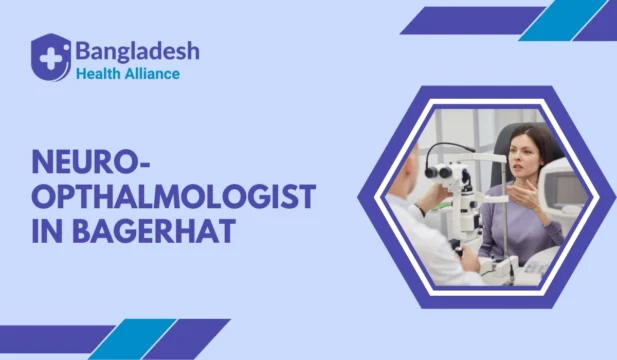What is a Neuro-Ophthalmologist?
A Neuro-Ophthalmologist is a specialized doctor who deals with eye problems related to the nervous system. While an Ophthalmologist focuses primarily on eye health, a neuro-ophthalmologist integrates the study of the brain, nerves, and visual pathways that affect vision. This specialized field is crucial when vision problems are caused by neurological disorders like stroke, optic nerve diseases, or neurological conditions affecting the eyes.
In Bagerhat, Neuro-Ophthalmologists help diagnose and treat vision issues that stem from neurological causes, offering expert care for patients whose vision problems cannot be explained by typical eye conditions.
What Can a Neuro-Ophthalmologist Help With?
A Neuro-Ophthalmologist in Bagerhat can treat a variety of conditions where the eyes and the nervous system are interconnected, including:
- Vision problems related to brain injuries: Identifying and treating vision problems caused by head trauma or concussions.
- Optic nerve diseases: Diagnosing and treating conditions affecting the optic nerve, such as optic neuritis or optic neuropathy.
- Visual disturbances: Addressing issues like double vision (diplopia) or visual field loss due to neurological conditions.
- Neurological causes of blindness: Diagnosing and managing cases where neurological issues lead to partial or total loss of vision.
- Pituitary disorders: Treating vision problems related to pituitary tumors or pituitary gland dysfunction.
- Stroke-related vision loss: Helping patients recover vision lost due to a stroke or transient ischemic attacks (TIAs).
- Severe headaches and migraines: Managing vision problems associated with migraines, including visual auras.
- Movement disorders affecting vision: Treating conditions like nystagmus (involuntary eye movements) that affect vision.
List of Conditions Relevant to Neuro-Ophthalmology:
- Vision loss from neurological disorders (e.g., optic neuritis, optic neuropathy)
- Double vision (diplopia)
- Visual field loss (e.g., hemianopia, quadrantanopia)
- Pituitary gland disorders (e.g., pituitary tumors affecting vision)
- Stroke-related vision loss
- Headaches and visual auras (e.g., migraines)
- Nystagmus (involuntary eye movements)
- Vision changes after brain injury or concussions
- Neurological causes of blindness
- Papilledema (swelling of the optic disc due to increased intracranial pressure)
Why Choose a Neuro-Ophthalmologist in Bagerhat?
Choosing a Neuro-Ophthalmologist in Bagerhat is essential if you are experiencing vision problems that may be linked to neurological disorders. Conditions that affect the brain and nervous system can impact the eyes in various ways, and an experienced neuro-ophthalmologist can help diagnose the root cause and offer effective treatments.
Whether you are dealing with double vision, vision loss after a stroke, or conditions related to the optic nerve, a Bagerhat-based Neuro-Ophthalmologist will provide specialized care to address these complex issues. They are skilled at distinguishing between typical eye problems and those related to neurological conditions, ensuring you receive the appropriate care for your situation.
How Does Neuro-Ophthalmology Treatment Work?
Neuro-ophthalmology treatment typically involves the following steps:
Initial consultation:
The specialist will begin by reviewing your medical history and conducting a detailed eye examination to assess your symptoms. They may also ask about any neurological conditions or head injuries that could be affecting your vision.
Diagnostic tests:
The neuro-ophthalmologist may use tests like visual field testing, optical coherence tomography (OCT), fundus photography, and MRI scans to diagnose conditions related to the brain or optic nerve.
Treatment options:
Depending on the diagnosis, treatment may involve:
- Medications (e.g., steroids for optic neuritis or antimigraines for visual auras)
- Surgical interventions (e.g., surgery for pituitary tumors or addressing nerve issues)
- Vision therapy: Providing exercises or aids to help improve vision and manage conditions like double vision.
Ongoing monitoring:
For chronic or progressive conditions, regular follow-up visits are necessary to track your vision and neurological health and adjust treatments as needed.
The Neuro-Ophthalmologist will develop a tailored treatment plan to manage your symptoms and improve your quality of life.
Find a Neuro-Ophthalmologist in Bagerhat
If you’re experiencing vision problems linked to a neurological condition, it’s crucial to seek care from a qualified Neuro-Ophthalmologist in Bagerhat. These specialists offer comprehensive care, diagnosing and treating complex conditions that affect both the eyes and the nervous system.
Contact us today to book an appointment with a trusted Neuro-Ophthalmologist in Bagerhat and take control of your vision health!
Frequently Asked Questions
How can I find a Neuro-Ophthalmologist in Bagerhat?
To find a Neuro-Ophthalmologist in Bagerhat, you can search through our platform for specialists who treat vision problems related to neurological conditions. If you need assistance, we can help connect you with the right doctor.
What are the symptoms that require a visit to a Neuro-Ophthalmologist?
If you experience symptoms like double vision, sudden vision loss, eye pain, or visual disturbances associated with headaches or a recent brain injury, you should consult a Neuro-Ophthalmologist for an assessment. They specialize in diagnosing and treating these complex symptoms.
What types of conditions are treated by a Neuro-Ophthalmologist?
A Neuro-Ophthalmologist treats conditions where the brain or nervous system affects the eyes, such as optic neuritis, stroke-related vision loss, pituitary gland disorders, double vision, and migraines with visual auras.
Can a Neuro-Ophthalmologist help with vision problems caused by a stroke?
Yes, a Neuro-Ophthalmologist specializes in treating vision problems related to neurological conditions like stroke. They can help manage vision loss, visual field deficits, and other symptoms caused by brain injuries or neurological disorders.
How is double vision treated by a Neuro-Ophthalmologist?
Treatment for double vision may include addressing the underlying cause, such as managing neurological conditions, prescribing prism glasses, performing vision therapy, or in some cases, surgical interventions to correct eye alignment.
Conclusion
If you’re dealing with vision problems linked to neurological conditions such as stroke, double vision, or optic nerve diseases, a Neuro-Ophthalmologist in Bagerhat can help you find the right treatment. These specialists offer expert care and comprehensive treatment plans to address complex eye and brain-related issues.

